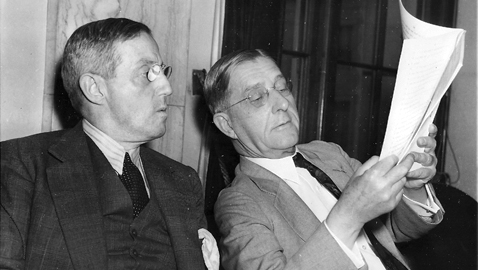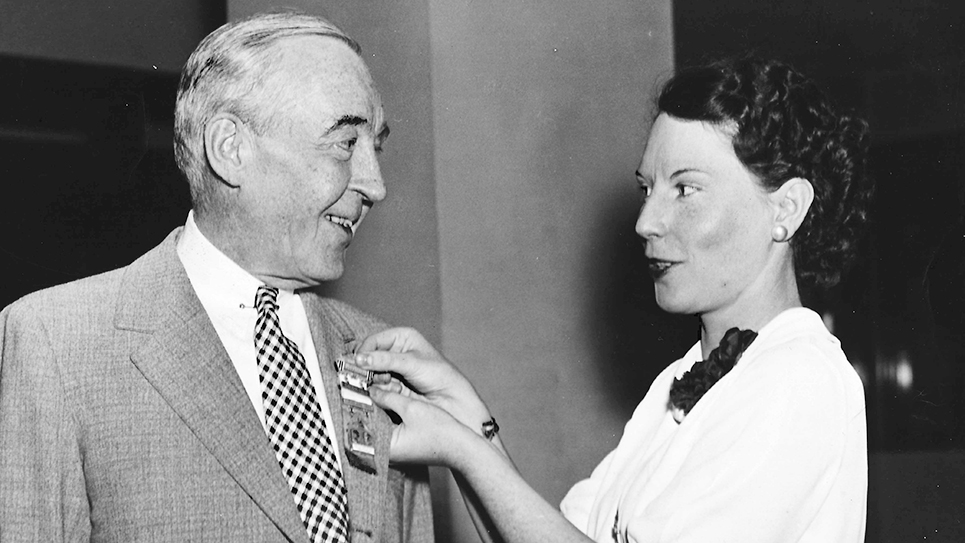
From the author’s personal collection.
Senator Peter Gerry of Rhode Island (left) with Senator Josiah W. Bailey of North Carolina
There are few people in our community who haven’t either heard of or visited the magnificent Biltmore House. Biltmore was the vision of George Washington Vanderbilt II, the grandson of Commodore Cornelius Vanderbilt. George Vanderbilt’s father, William, was the richest man on earth at the time of his death in 1896 with a fortune of almost two hundred million dollars, the equivalent to a mindboggling $5,015,664,899 in today’s currency. Commodore Vanderbilt had built the family fortune as a railroad mogul and his son had managed to quite nearly double his inheritance by the time he died.
George Vanderbilt visited North Carolina and decided he would build himself a country home near Asheville. Biltmore House remains the largest privately owned residence in the United States today.
The scion to the Vanderbilt fortune married Edith Stuyvesant Dresser in 1898; the couple had one daughter, Cornelia. George Vanderbilt died unexpectedly of heart failure on March 6, 1914. Vanderbilt was only fifty-one at the time of his death.
Edith Vanderbilt met and married Peter Goelet Gerry (pronounced GARY). Peter Gerry was the descendant of Elbridge Gerry, a Vice President of the United States and a signatory of the Declaration of Independence. Elbridge Gerry is perhaps best remembered today for being the father of “gerrymandering”, the process by which political subdivisions are divided for the purpose of helping a particular political party retain control.
Peter Gerry was born September 18, 1879 (making him six years younger than Edith) and he and his brother Robert were tutored as children by William Mackenzie King, a later Prime Minister of Canada. Gerry attended Harvard and began the practice of law in Rhode Island in 1906.
Gerry’s first marriage was to Mathilde Townsend who was herself from a wealthy family and prominent in Washington society. The union between Gerry and his first wife ended in divorce in 1925. Peter Gerry’s personal appearance coincided with his chosen profession; he was well tailored and as he aged, he looked more and more like the popular conception of a Senator of the United States.
Peter Gerry was less interested in practicing law than politics and when he first became interested in public service, Rhode Island was a predominately Republican state. Gerry was a Democrat and won election to Congress in 1912 when the national Republican Party was torn asunder by the bitter fight between incumbent President William Howard Taft and former President Theodore Roosevelt. Gerry lost his bid for reelection in 1914, largely due to the Republican Party again being united. Gerry decided to seek election to the United States Senate in 1916 against Republican Henry F. Lippitt. Gerry won the election and was reelected in 1922. Senator Gerry was unseated in 1928 by Felix Hebert, a year when the Republican Party was very strong across the country. Gerry tried to make a political comeback in 1930, challenging Rhode Island’s other Republican Senator Jesse H. Metcalfe, but was unsuccessful.
Gerry was an urbane and very wealthy man, as was Jesse Metcalfe. Both Metcalfe and Gerry also owned significant interests in newspapers in Providence, Rhode Island and neither man objected to spending freely from his personal funds for their respective campaigns. Gerry proved to be a shrewd politician and employed as his Secretary (today it would be Chief of Staff) James A. Byrn, a clever Irishman who thoroughly understood the rough and tumble of Rhode Island politics. Campaigns in Rhode Island were hardly sedate affairs, nor oftentimes very pretty. Money spent in the right places frequently had the effect of determining the outcome of elections in Rhode Island. Gerry was a Yankee Democrat and his defeat in 1928 was not only due to the Republican tide, but the fact his Republican opponent, Felix Hebert, was of French extraction and there was a large contingent of Rhode Islanders who were of French descent.
Following his defeat by Senator Jesse Metcalfe, Peter Gerry was not done with politics by any means and he kept a careful eye on political developments in Rhode Island through six years of forced exile. The Great Depression, as it did in many other states across the country, helped to transform politics and voting patterns in Rhode Island. Democrats captured the governorship with the election of Theodore Francis Green in 1932. Green, like Gerry, was a very wealthy Yankee Democrat who also employed a politically savvy Irishman as his secretary, but the similarities ended there. The two men would become intraparty rivals and neither much liked the other. Green and Gerry would comprise the top of the Democratic ticket in 1934; Green was seeking reelection as governor while Peter Gerry fought a rematch with Republican Senator Felix Hebert. Both men were elected and Green joined Gerry in the Senate in 1936 when he defeated Senator Jesse H. Metcalfe.
Theodore Francis Green was an avid supporter of President Franklin D. Roosevelt, while Peter Gerry quickly became disillusioned with the New Deal. Green supported Roosevelt’s efforts to pack the U. S. Supreme Court while Gerry became a leader in the Senate to defeat FDR’s proposal. Theodore Francis Green was sixty-nine years old when he was first elected to the United States Senate and served for twenty-four years, finally retiring when he was ninety-two years old. Green was legendary for his frugality, almost always taking the street car to the Senate, while Peter Gerry employed a full staff to take care of himself and his wife.
Gerry did support much of Roosevelt’s foreign policy, but his closest associates inside the Senate were men like Harry F. Byrd of Virginia and Josiah W. Bailey of North Carolina, both of whom were deeply conservative and hostile to much of the New Deal and Franklin Roosevelt personally. Senator Gerry, like many of his contemporaries, was more of a Wilsonian Democrat than a New Deal Democrat.
Not surprisingly, Peter and Edith Gerry were quite active in the social life of the Capitol. Senator and Mrs. Gerry maintained homes in Providence, Rhode Island, Washington, D. C., Asheville, North Carolina, New York City, and an estate in Lake Delaware, New York. Much of Senator’s Gerry’s wealth was tied up in real estate and the Gerry family owned considerable commercial property in New York. Edith Vanderbilt Gerry had not inherited the bulk of her first husband’s wealth, which had gone to her daughter, Cornelia. Senator and Mrs. Gerry constantly sold off property to meet expenses, as Peter Gerry found it impossible to maintain their lifestyle on a senator’s salary.
Senator Gerry was easily reelected in 1940 and continued to support Franklin D. Roosevelt’s foreign policy as war loomed all across Europe. Gerry was not a power in the Senate and his interrupted service kept him from attaining a committee chairmanship. Personally, Gerry was courtly and kind to visitors and callers and while he had no children, nieces and nephews still remember him as an imposing man, although not an especially doting uncle. He had been unusually close to his brother Robert during their shared childhood, but over the years the two drifted apart. One of Robert’s nephews vividly recalls visiting his grandfather at his estate in Lake Delaware, New York, which adjoined that owned by his Uncle Peter. Robert and his grandson were out shooting and suddenly Senator Gerry appeared out of the woods and loudly complained, causing Robert to mutter under his breath, “I wish you’d shot the son-of-a-bitch!”
Peter Gerry did not seek reelection to the United States Senate in 1946 and while he was sixty-seven years old at the time, many of his colleagues continued running long after seventy. Gerry may have decided not to run due to the fact Rhode Island’s much younger and very ambitious Governor J. Howard McGrath was anxious to go to the Senate. Peter Gerry may have felt he didn’t care to go to the expense and effort of another campaign in what would be a very difficult primary campaign. Gerry’s retirement may also have had much to do with declining health.
Peter and Edith Gerry retired and continued to divide their time between various homes. Edith Vanderbilt Gerry is still remembered by Gerry family members as a charming and entertaining woman, even after suffering a serious stroke. Peter Gerry began suffering from dementia and died on October 31, 1957 at age seventy-eight. Oddly, he died within a few hours of the brother he had been so close to in his younger days.
Despite having served in Congress for twenty-six years and through some of our country’s most harrowing times, Peter G. Gerry is little remembered today, even in Rhode Island. The Providence airport is named for his longtime rival Theodore Francis Green; there is no similar memorial to Peter Gerry. The home Gerry shared with Edith Vanderbilt Gerry in Providence is now a gallery affiliated with the Rhode Island School of Design, a bequest of Edith Gerry.
Senator Gerry’s personal and political papers seemed to have disappeared following his death, which makes it even more difficult for historians to consider his career in Congress. Yet, during their time, Peter and Edith Gerry represented one of the ultimate “power couples” in Washington, D. C., as well as life in a different age.






